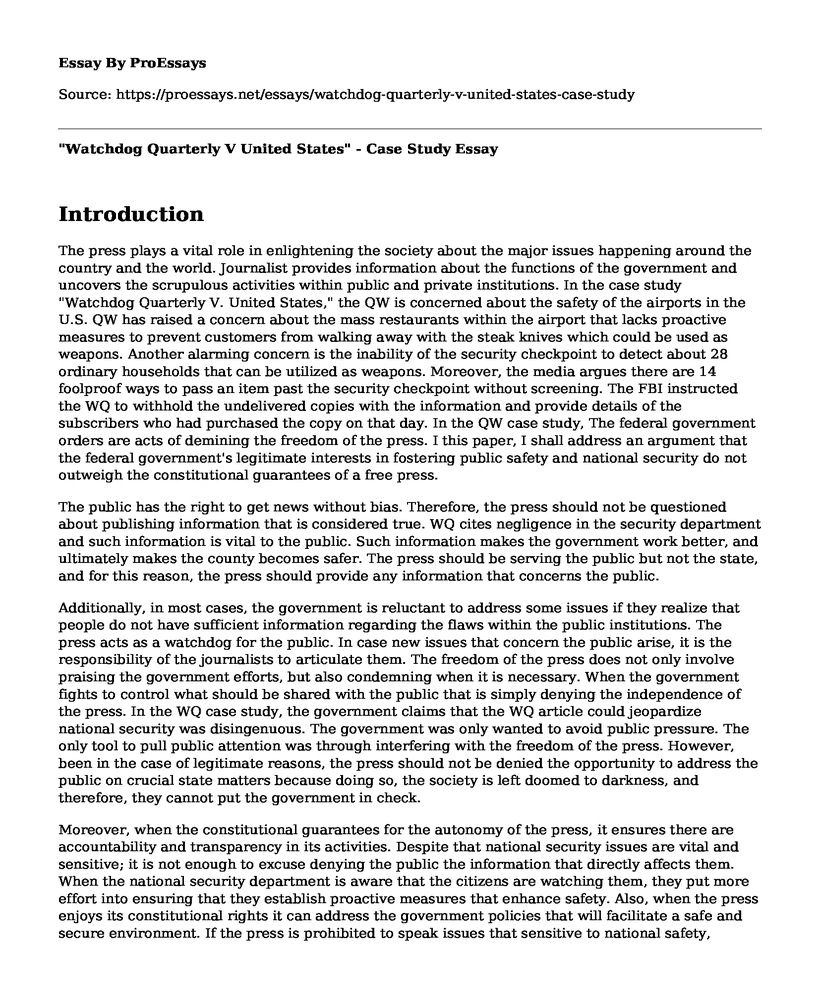Introduction
The press plays a vital role in enlightening the society about the major issues happening around the country and the world. Journalist provides information about the functions of the government and uncovers the scrupulous activities within public and private institutions. In the case study "Watchdog Quarterly V. United States," the QW is concerned about the safety of the airports in the U.S. QW has raised a concern about the mass restaurants within the airport that lacks proactive measures to prevent customers from walking away with the steak knives which could be used as weapons. Another alarming concern is the inability of the security checkpoint to detect about 28 ordinary households that can be utilized as weapons. Moreover, the media argues there are 14 foolproof ways to pass an item past the security checkpoint without screening. The FBI instructed the WQ to withhold the undelivered copies with the information and provide details of the subscribers who had purchased the copy on that day. In the QW case study, The federal government orders are acts of demining the freedom of the press. I this paper, I shall address an argument that the federal government's legitimate interests in fostering public safety and national security do not outweigh the constitutional guarantees of a free press.
The public has the right to get news without bias. Therefore, the press should not be questioned about publishing information that is considered true. WQ cites negligence in the security department and such information is vital to the public. Such information makes the government work better, and ultimately makes the county becomes safer. The press should be serving the public but not the state, and for this reason, the press should provide any information that concerns the public.
Additionally, in most cases, the government is reluctant to address some issues if they realize that people do not have sufficient information regarding the flaws within the public institutions. The press acts as a watchdog for the public. In case new issues that concern the public arise, it is the responsibility of the journalists to articulate them. The freedom of the press does not only involve praising the government efforts, but also condemning when it is necessary. When the government fights to control what should be shared with the public that is simply denying the independence of the press. In the WQ case study, the government claims that the WQ article could jeopardize national security was disingenuous. The government was only wanted to avoid public pressure. The only tool to pull public attention was through interfering with the freedom of the press. However, been in the case of legitimate reasons, the press should not be denied the opportunity to address the public on crucial state matters because doing so, the society is left doomed to darkness, and therefore, they cannot put the government in check.
Moreover, when the constitutional guarantees for the autonomy of the press, it ensures there are accountability and transparency in its activities. Despite that national security issues are vital and sensitive; it is not enough to excuse denying the public the information that directly affects them. When the national security department is aware that the citizens are watching them, they put more effort into ensuring that they establish proactive measures that enhance safety. Also, when the press enjoys its constitutional rights it can address the government policies that will facilitate a safe and secure environment. If the press is prohibited to speak issues that sensitive to national safety, journalists will choose to ignore new important matters of security concern, if the prior raised concerns have not been acted upon. In this case, the press may overlook its societal responsibility. Since the public depends on the press information to demand accountability when safety and national security interests outweigh the freedom of media, it could indicate the citizens have been deprived the power to demand accountability, and as a result, there could no guarantee for safety.
Conclusion
To sum it up, the federal government's legitimate interests in fostering public safety and national security is not more important than the constitutional guarantees of a free press. When the freedom of media is respected, the public can easily acquire information regarding the security concern of the public without bias. Additionally, people have a chance to ensure that the security department observes accountability and transparency in its daily mandate. When the government is aware that the public is watching how it is running its affairs, it will swiftly rectify any flaws to avoid public criticism. Moreover, if the government upholds the freedom of the press is an indication the government respects the independence of media. An autonomous media can articulate vital matter to enlighten, praise or criticize. Therefore, WQ was right to address the flaws that posed danger to the safety of the public. It was QW's responsibility to enlighten the public about the threats within the airports. Barring the media from addressing national defense issue is not a solution against terrorist attacks.
Cite this page
"Watchdog Quarterly V United States" - Case Study. (2023, Mar 13). Retrieved from https://proessays.net/essays/watchdog-quarterly-v-united-states-case-study
If you are the original author of this essay and no longer wish to have it published on the ProEssays website, please click below to request its removal:
- Vertigo - Movie Review Example
- Live Jazz Concert Review
- Analysis of the Film "The Battle of Algiers" Paper Example
- Drug Policy of Foreign Countries Essay Example
- "Your Name" Film Analysis Essay
- Essay Example on Technological Revolution Transforming Education: Impact on Society
- Essay Sample on Sick Around America: High Medical Bills in US Revealed







